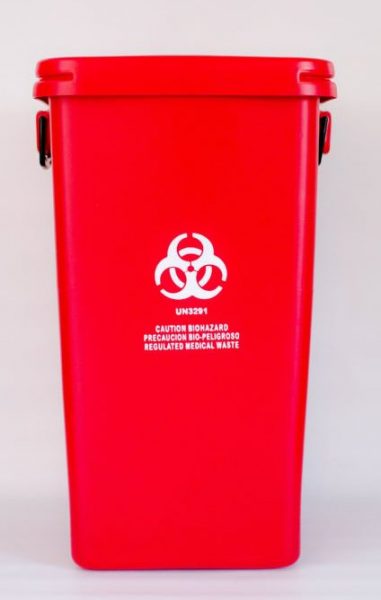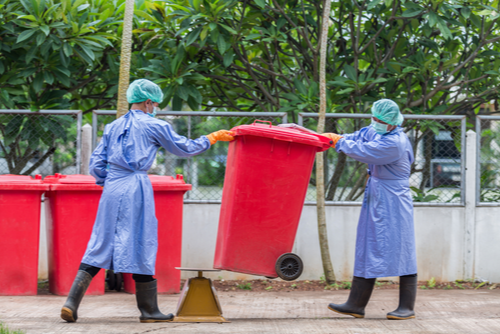Proactive Health Solutions: Picking the very best Medical Waste Removal Near You
Stay Ahead of Laws: Specialist Suggestions on Medical Waste Disposal
In a world where the health care sector is constantly developing, it is critical for clinical centers to stay ahead of policies when it concerns the appropriate disposal of clinical waste. With rigid standards and constant governing adjustments, it can be testing to browse the intricacies of this procedure. Nonetheless, with experienced advice, facilities can ensure compliance and mitigate risks connected with improper waste disposal. From comprehending the different categories of medical waste to applying the appropriate collection and partition techniques, this discussion will give beneficial understandings and actionable tips to aid centers stay ahead of laws in the ever-changing landscape of medical waste disposal.
Recognizing Medical Waste Categories
Recognizing clinical waste categories is necessary for proper disposal and administration in healthcare facilities. Clinical waste refers to any kind of waste generated by health care tasks that may present a threat to public health and wellness or the environment. It is important to classify medical waste precisely to guarantee its safe handling, disposal, transport, and treatment.
There are numerous categories of medical waste that health care centers require to be aware of. The most typical groups include infectious waste, pathological waste, sharps waste, pharmaceutical waste, and chemical waste. Each classification has details guidelines and policies for its appropriate administration and disposal.
Transmittable waste includes materials contaminated with blood or other bodily fluids, such as gloves, gowns, and lab societies. Pathological waste describes human cells, body organs, or body components that call for unique handling and disposal. Sharps waste consists of made use of needles, syringes, and various other sharp objects that can cause injury and transmit infections. Pharmaceutical waste consists of expired, unused, or polluted medicines that require mindful handling and disposal. Chemical waste consists of solvents, anti-bacterials, and various other chemical compounds utilized in health care facilities.
Staying Up-To-Date With Regulatory Adjustments
Remaining present with regulative changes is essential for healthcare facilities to make certain conformity and appropriate administration of clinical garbage disposal. medical waste removal. With regulations frequently progressing, it is necessary for health care facilities to remain updated to avoid fines, fines, and potential injury to the atmosphere and public health
To remain ahead of governing modifications, healthcare centers ought to develop a system for tracking and monitoring updates. This can be done by signing up for regulatory e-newsletters, attending meetings and workshops, and proactively joining industry associations. Additionally, facilities need to assign an employee or group in charge of remaining informed and distributing information to appropriate stakeholders.
Normal communication with governing companies is additionally important. Healthcare centers ought to develop relationships with local, state, and government companies to guarantee they understand any type of changes in guidelines that might impact their waste administration techniques. This can be done through routine conferences, participation in public comment periods, and aggressive engagement with regulatory companies.
Furthermore, medical care facilities need to think about partnering with waste monitoring business that concentrate on medical garbage disposal (medical waste disposal services with WasteX). These firms are often well-versed in the most recent laws and can provide support and assistance to make certain conformity
Implementing Proper Collection and Segregation Methods
To successfully take care of clinical garbage disposal, medical care centers have to develop correct collection and partition approaches based on governing standards. Applying these approaches makes certain the secure handling and disposal of possibly harmful products, safeguards the atmosphere, and reduces the risk of infections and injuries to healthcare employees and the basic public.
Correct collection and partition techniques involve using marked containers and classifying systems. Health care facilities should provide plainly identified containers for different sorts of clinical waste, such as sharps, contagious waste, pharmaceutical waste, and non-hazardous waste. These containers ought to be color-coded and clearly significant to prevent confusion and promote easy recognition.
In addition, health care facilities need to educate their personnel on the correct treatments for gathering and segregating clinical waste. This includes educating them on the various kinds of waste, the appropriate containers to make use of, and the value of following regulations and standards. Regular training sessions and correspondence course should be performed to guarantee that employee remain updated on best methods.
Furthermore, medical care facilities must establish a system for routine collection and disposal of medical waste. This may entail partnering with certified waste monitoring business that concentrate on medical garbage disposal. These firms will make sure that the collected waste is delivered and gotten rid of in conformity with regulatory demands.
Picking the Right Disposal Methods

Incineration is just one of one of the most effective and common techniques for throwing away particular kinds of clinical waste, such as pathological waste and sharps. It entails the regulated burning of waste go at high temperatures, decreasing it to ash. Nevertheless, incineration can launch dangerous toxins right into the air and add to air contamination.

Other disposal approaches include chemical therapy, microwave treatment, and landfilling. Chemical therapy includes the usage of chemicals to sanitize and neutralize the waste. Microwave therapy uses microwave power to heat and sanitize the waste. Landfilling involves burying the waste in a marked garbage dump location (medical waste disposal services with WasteX). Nonetheless, landfilling should be the last resource because of the prospective danger of contamination to dirt and groundwater.
Ensuring Conformity Through Documents and Training
After thoroughly considering the suitable disposal methods for clinical waste, health care facilities must ensure conformity with guidelines and minimize ecological impact by executing effective documentation and training procedures. This action is critical in keeping a secure and lasting atmosphere for both medical care employees and the public.

Training is equally crucial in ensuring compliance with guidelines. Medical care employees who deal with clinical waste needs to receive suitable training on waste partition, taking care of, and disposal treatments. This training should cover topics such as the appropriate usage of individual safety equipment, identification of different types of waste, and the appropriate disposal additional reading techniques for each and every waste group. By providing extensive training, health care facilities can equip their personnel to make educated choices and lessen the threat of inappropriate garbage disposal.
Conclusion
Finally, remaining in advance of guidelines in medical waste disposal is essential for healthcare centers. medical waste removal. Recognizing the various classifications of medical waste, remaining upgraded with regulative changes, applying correct collection and segregation methods, picking the proper disposal techniques, and guaranteeing conformity with documentation and training are all essential actions. By adhering to these guidelines, medical care companies can efficiently dispose and take care of of clinical waste in a accountable and safe way
From understanding the various classifications of clinical waste to carrying out the right collection and partition methods, this conversation will give important understandings and actionable pointers to assist centers stay in advance of regulations in the ever-changing landscape of medical waste disposal. - medical waste disposal services with WasteX
The most usual categories include contagious waste, pathological waste, sharps waste, pharmaceutical waste, and chemical waste. Health care centers must give plainly labeled containers for different types of medical waste, such as sharps, infectious waste, pharmaceutical waste, and non-hazardous waste. Healthcare facilities ought to establish an extensive system to tape and track all aspects of clinical waste disposal, consisting of kinds of waste created, amounts, and disposal approaches made use of. Medical care employees that manage clinical waste must get proper training on waste segregation, dealing with, and disposal procedures.